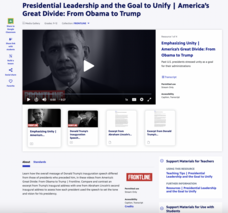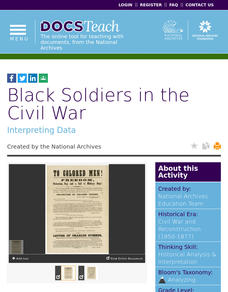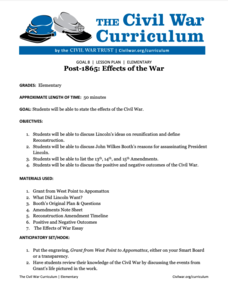Carolina K-12
African American Troops in the Civil War
Middle schoolers explore the history of the African-American troops that served during the American Civil War. After reading primary source documents that detail the controversies about permitting freemen and former slaves to serve,...
K20 LEARN
Blue or Gray? Perspectives on the Civil War
Using primary and secondary sources, such as letters and diaries from soldiers and civilians, learners consider why people fought in the American Civil War. A role-playing Historical Mingle activity, as well as discussion questions and...
K20 LEARN
The Emancipation Proclamation: Expanding The Goals Of The Civil War
Should Juneteenth be recognized as a national holiday? To prepare to take a stance on this question, young historians first analyze the Emancipation Proclamation and compare it to Lincoln's first Inaugural Address. Scholars then read an...
K20 LEARN
The Bank Of Justice: Civil Rights In The US
To launch a study of racial segregation and integration, young historians first watch a news video about a prom in Georgia that was first integrated in 2013. They then compare the goals in Lincoln's Gettysburg Address to King's "I Have a...
DocsTeach
Memorializing Abraham Lincoln in Washington, DC
The legacy of President Lincoln continues to endure. Scholars view images of three statues that have been created to honor President Lincoln. Academics analyze the three images and share their findings in a group discussion format. Young...
Center for History Education
Did Southern Free Men of Color Fight for the Ideals of the South?
Much of history is distasteful. Primary sources often reveal attitudes acceptable at the time that no longer are. But to understand controversial historical events, historians must examine primary sources that represent a wide variety of...
Center for History Education
Maryland During the Secession Crisis
While many think the United States was neatly divided between Northern and Southern states during the Civil War, border states like Maryland are more complicated. Using hands-on activities to measure distance and primary sources,...
Center for History Education
Lincoln and the Republicans: The Cause of the War?
In today's political rhetoric, many forget the pivotal role the Republican Party played in the causes of the Civil War. The party's formation was the final straw for Southerners who saw the enslavement of people of African descent a...
ESRI
Juneteenth: An American History through Maps
An interactive website traces the history of Juneteenth celebrations from their origin in Galveston, Texas, on June 19th to the present day. Using interactive maps, learners can find information about the African-American population...
Digital Public Library of America
Frederick Douglass and Abraham Lincoln
Frederic Douglass and Abraham Lincoln, although dissimilar in their backgrounds, were united in their views about slavery. A set of 14 primary sources permits scholars to examine the views of these two powerful men.
Digital Public Library of America
Uncle Tom's Cabin by Harriet Beecher Stowe
Harriet Beecher Stowe's Uncle Tom's Cabin has generated controversy since its publication in 1852. Here is a set of 12 primary sources that capture the controversies of the times while adding dimension and depth to any study of the novel.
DocsTeach
The Settlement of the American West
What do Abraham Lincoln and the Transcontinental Railroad have in common? Using a set of primary source documents, including pictures, maps, and treaties, class members link together the common themes of expansion into the American West....
DocsTeach
Lincoln's Suspension of Habeas Corpus During the Civil War
What is the balance between constitutional rights and security during a war? Young historians debate the question while looking at Lincoln's decision to suspect habeas corpus during the Civil War. After reviewing his order, discussion...
DocsTeach
Lincoln's 1863 Thanksgiving Proclamation
While most Americans connect the celebration of Thanksgiving to a colonial celebration of pilgrims and Native Americans, the national holiday was actually the product of a war-time measure by Abraham Lincoln during the Civil War....
PBS
Presidential Leadership and the Goal to Unify | America’s Great Divide: From Obama to Trump
Traditionally, a United States President's Inaugural Address establishes the tone and vision for his presidency. It has stressed the goal to unify the country and bring the political parties together after what are often divisive...
DocsTeach
Letter to President Abraham Lincoln from Annie Davis
What freed enslaved people? The answer, it turns out, is complicated. Using a set of online documents and writing prompts, young historians examine a series of primary sources, including a letter from a woman asking if she was freed and...
DocsTeach
From Dred Scott to the Civil Rights Act of 1875: Eighteen Years of Change
What do a photo of Abraham Lincoln, a map for the Battle of Antietam, and the Dred Scott decision all have in common? Learners consider the broader question as they examine documents related to civil rights during the Civil War and...
DocsTeach
Black Soldiers in the Civil War
Get hands on virtually with recruitment posters for African American soldiers during the Civil War with an interactive online resource. By highlighting key phrases in the posters using an Internet tool, learners discover how African...
Curated OER
1864-1865: Bringing the War to an End
An interesting lesson plan explains the last battles of the war and the terms of the Articles of Surrender. It also analyzes the election of 1864 with copies of the Baltimore and Chicago platforms. To conclude the lesson, academics...
Curated OER
Election of 1864
An interesting lesson plan uses a hands-on-activity and group discussion to explore the 1864 presidential election and Lincoln's plans for ending the Civil War. Designed for high school, the resource also requires historians to...
American Battlefield Trust
1862: Antietam and Emancipation
Was the Emancipation Proclamation a revolutionary document or just a military strategy? It proclaimed that all those enslaved in Confederate states would be "forever free." Logistically, though, it did little. The order, however,...
American Battlefield Trust
Southern Secession and Abraham Lincoln’s Presidential Election
President Abraham Lincoln: a true humanitarian or a savvy politician? The lesson plan focuses on Abraham Lincoln's presidency and the secession of the southern states. Academics interpret how Lincoln's presidential platform promoting...
American Battlefield Trust
The Gathering Storm: The Coming of the Civil War
Slavery or states' rights: What really started the American Civil War? A lesson geared towards middle schoolers explores the causes of the Civil War. Scholars view an interactive of the Gathering Storm exhibit online and complete a...
American Battlefield Trust
Post-1865: Effects of the War
What did Lincoln want? Historians still debate this question, and perhaps people will never fully know. Class members examine the legacies of the war, including the Thirteenth, Fourteenth, and Fifteenth Amendments. The lesson plan also...

























